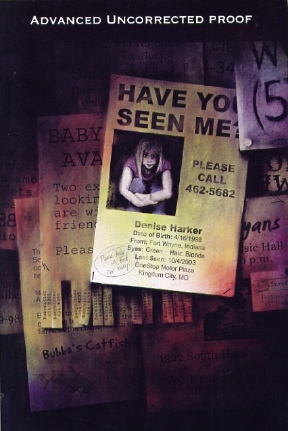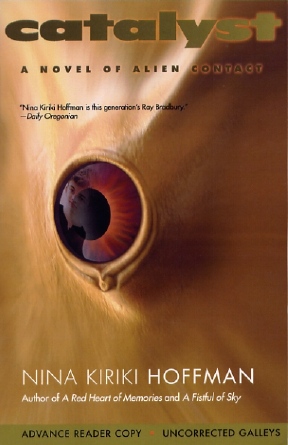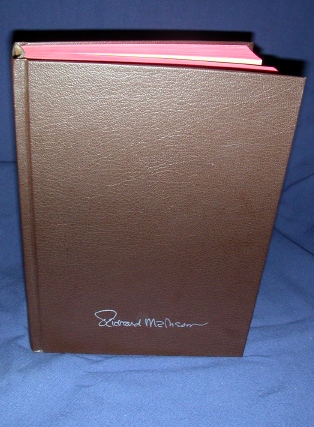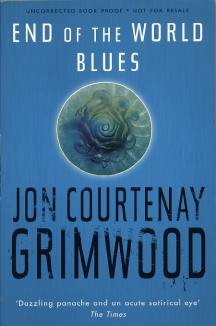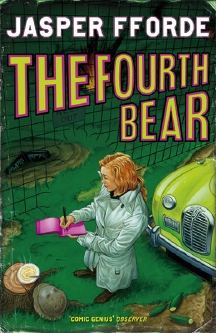|
|
|
This Just In...News from the Agony Column
|
07-14-06: Gary A. Braunbeck Has 'Prodigal Blues' |
|||
Finishing
Up a Week of the Literary Blues
What's happening in 'Prodigal Blues' is actually more horrific than some of the supernatural menaces one might have encountered in Braunbeck's previous work. Because Braunbeck has a toe-tapping tale of suspenseful terror, I'm going to elide the details. Suffice it to say that Mark Sieber manages the janitors at a small college. While at a restaurant, he spots a girl whose face he'd just seen on a "Missing Child" poster. He saves her, but damns himself. And Braunbeck's readers as well, for you'll be glued to the pages and grimacing for the next day or so. Braunbeck may not be dealing in the supernatural with this novel, but he creates a similarly mythic effect as he enters the "House of Heorot" in search of a contemporary Grendel who is every bit as monstrous as anything out of Norse legend. But first, Braunbeck nails down the emotional reality of his protagonist in first-person prose that has the raw honesty of a hardboiled memoir. The relationship between Mark and his wife is so vivid, so real, that Mark's descent into the modern Heorot is made all the more horrifyingly real. Braunbeck's dialogue shines in the best tradition of writers like George Pelecanos and David Corbett. Indeed, 'Prodigal Blues', as surreal as it gets, never loses its hardcore attachment to the most unpleasant of realities. Lest you think that 'Prodigal Blues' is wall-to-wall ugliness, it's important to note that the Braunbeck's raw honesty allows virtues to shine as brightly as vices. There's an undercurrent of slit-your-wrists-and-hope-to-die humor that won’t make you laugh, exactly, but will does manage to crack the brick-wall stress level created by Braunbeck. But it's a) not that funny, just because the shit's piled so high and b) not intended to really be funny. No, the counterweight to all the ugliness on display here is Braunbeck's utterly clear vision of actual humans, some of whom have redeeming qualities. In fact, under other circumstances, readers might feel that these are people you’d like to sit and chat with. There is genuine warmth in the banter between husband and wife, even if it's played out on a knife-edge. There's genuine heroism on display, the kind you might read about in the back pages of the news paper, the heroism of those forced to deal with human dirt, those who just sweep it aside. Not pretty, not glamorous, not heroic in scale. Only in intent, and Braunbeck's the kind of skilled writer who can get to intent with prose that lives and dies by show, don't tell. In any work of this nature, a lot is riding on the antagonist, the nemesis. If you make them too suave, too cool, too smart, the James Bond Villain / Hannibal Lecter effect kicks in. They become a hero in black, and in so doing, depart the realm of the real. On the other hand, if your antagonist is too ugly, well, you can reach the point of unreadability, and that's more the risk that Braunbeck runs here. He gets past that by offering a POV character we like and a monster who can, like Lecter at his most insanely charismatic, put forth frothing Shakespearean rants. Scary, but also humanizing. But scary, yes, very scary stuff here. Make no mistake about it. If stories that involve harm to children are verboten to your brain, then, alas, you'll have to miss this one. It's good enough that you might feel scarred after reading it. But in the end, it is that good. And it is really the first non-supernatural novel by Braunbeck, but one hopes not the last. As ever, Cemetery Dance puts together a wonderful hardcover novel. Deena Warner's illustrations are plentiful, dark and suggestive. They ratchet up the level of disturbance and move the story but are tastefully rendered. I've never seen her stuff in a novel before, but the outstanding quantity and quality suggest that she's worth seeking out in other venues. Braunbeck's been hitting the paperback racks with his novels of the supernatural, but there's real potential for him to eke his way into the mainstream without ever really becoming mainstream. No Braubeck is definitely not mainstream fiction. He's more like the big, solid rock that sits in the middle of the river. Always there. Always strong. |
|
07-13-06: Nina Kiriki Hoffman Finds the 'Catalyst' |
|||
The
Alien Underground
Nina Kiriki Hoffman chooses the direct approach in her creepy, sensual, sort-of YA novel 'Catalyst' (Tachyon Publications ; August, 2006 ; $14.95). Hoffman, whom I first encountered in the groundbreaking anthology series 'Pulphouse', has published in just about every genre one can imagine. For me, the iconic Hoffman novels are her (also) sort-of YA trilogy, 'A Red Heart of Memories', 'Past the Size of Dreaming' and 'A Stir of Bones'. I loaned these books to several ardent readers, all of whom devoured them and asked for more. Alas, by the time that 'A Fistful of Sky' came out, these novels were out of print, in the sort of screw-up that seems to dog writers of genre fiction. But now Hoffman has returned, and this time through the auspices of the wonderful Bay-area concern, Tachyon Publishing. 'Catalyst' is a gripping read, short, almost sweet and pretty damn enticingly weird. Histly is the bully of the mid-teen edsection on Chuudoku, and she's got it in for Kaslin. She's augmented in all the wrong ways with self-defense mechs that she can freely use to torment those who catch her eye. Kaslin, an immigrant without the fiscal wherewithal to get the augs, made the mistake of finding her fetching before he knew she was dangerous. Now he's prey. Histly's legs are augmented, and she can easily catch him in a flat-out race, so he's forced to use stealth to escape. When he runs into an unexplored cave, his escape route proves to be more problematic than his pursuer. Monsters. Maybe friendly. Maybe too friendly. They speak in plosives, and this first contact may not prove to beneficial. What Hoffman does here is to create a complex background setup that could easily sustain one or more novels that would play out in the realm of adults, for adult readers of fairly straightforward, sophisticated science fiction. Then, having created this fascinating background and ecology, she's chosen as her protagonist a midteen kid edging into the world of sexual awareness. This allows her to write a novel that is fully appropriate if consistently edgy for a young adult audience, but one that is also perfect for adults. Hoffman inhabits the head of her male protagonist with enough authority to make the reader suspect that she's experienced teenagers up close and personally. But she does so with the sort of distance that is appealing to readers of any age. And her aliens are entertainingly fresh, free of the usual clichés that we may love but we also love to leave behind. At 173 pages, 'Catalyst' straddles the line between novel and novella. For most readers, it will be a one or two-sitting journey. Make no mistake about it. This novel will definitely push some buttons and make readers feel fairly uncomfortable as Kaslin and Histly encounter critters that have ideas about the flesh that are closer to those of humanity than most humans would like to think about. But thinking about those edges is the point, and it's remarkable that Hoffman can get to that point in a manner so clear, so quick, so pared-down-to-the-bone. The ARC I have appears to be of the pretty-much-settled variety, and if that's the case, then I think that Tacyon may have a sort of hit on their hands. Now, I don’t know how much, er penetration this will get in the market. But when a writer of Hoffman's talents is given the kind of license that Tachyon clearly gave Hoffman (or that she brought to them, I'm not sure how the negotiations worked), then it's worthy of note to all readers, everywhere. 'Catalyst' is itself likely to be a catalyst for Hoffman and Tachyon. It's the kind of novel that could easily fit into an admittedly daring high-school curriculum. My take is that at least the kids would read it, and the adults who read it and were not inclined to burn it or write letters to the school board would be pleased. Really, most adults would be pleased to have their kids interested in anything other than video games and social networking websites. 'Catalyst' is a novel about alien life and alien planets and human life and human planets. Our own planet is starting to seem pretty alien to this adult, and the most alien lifeforms are the teenagers that avert their eyes and hustle to the back rooms of our suburban home. They speak in plosives too. Back off. Butt out. Our own world is no longer our own, and the more we experience, the more realize that it never was our own. We're forced to immerse ourselves in a life that is increasingly alien, in a world where the rules are different every day. How best to deal with it? The direct approach. Here it is. Open the book. Read the pages. Learn. |
|
07-12-06: A Vertical ARC |
|||
Suzuki,
Kishi, Suzuki
Some ARCs look great but still have a ways to go in the proofreading process; others have the traditional-to-ARCS solid-color cover, and may be pretty much the real deal, or have miles to go before they sleep. The ARC for David Mitchell's 'Black Swan Green' was a bound photocopy of the final novel. When you get an ARC that clearly needs proofreading, a quick-re-read of the final product is called for to ensure that there has been a final proofreading. A badly-proofed novel can surely ruin the reading experience. I've not read many final books where proofreading proved to be a problem, but it does happen. Since they’re not final versions of the books, and since they're not meant to be sold, ARCs are certainly not completely predictable. Innovative publishers can do whatever the heck they want. Take for example this Vertical ARC from the WHC, with the title, 'Birthday' and Koji Suzuki's name on the cover. The final version of the book 'Birthday' (Vertical-Inc ; December 5, 2005 ; $21.95) by Koji Suzuki will include three longish stories, we're told on the back cover of the ARC, that comprise back-stories to characters who appear in the novels of the 'Ring' trilogy. But this isn’t the only book being previewed in this ARC; and the whole book isn’t here, either. That makes this particular ARC a one-of-a-kind. But, let's at least get an idea of what to expect in 'Birthday', which seems to follow a theme of offering looks at the lovers of the characters who populate the 'Ring' trilogy. "Lemon Heart" ("a.k.a. Ring 0" we are told on the back of the ARC) offers a glimpse of Sadako in love with a fellow actor. Sadako is the vengeful she-ghost from 'Ring', and thus one can imagine that this is a match made in hell. The reference to "Ring 0" on the back cover makes one inclined to believe that this might be the prose version of the movie dubbed Ring 0. But I'd never bet the bank on such an occurrence. This story runs some 95 pages in the ARC, and thus uses up half the page count in the final three-story collection. Written in short-short chapterettes, it's the kind of toe-tapping Suzuki as SF/Horror writer I particularly enjoy. Also coming in the final product will be "Coffin in the Sky", in which the beloved of the scurrilous Ryuchi Takamaya from 'Ring' and 'Spiral' dies a lonely death on a rooftop, giving birth to Sadako II. That makes it sort-of an outtake from the second novel, 'Spiral'. And finally, for our outtake from 'Loop', we get the story of Reiko, the love interest of Kaoru, who entered the 'Loop' matrix. But all we get in the 'Birthday' ARC is the first story; surely enough to give an idea of the feel of that first story, but Suzuki goes all over the map; my inclination would be to suspect that the stories tend to mirror that novels they complement. As such, 'Birthday' will be a must-buy for the 'Ring' crowd, a sort of dotting-the-i's-and-crossing-the-t's of the 'Ring Trilogy'. But the 'Birthday' ARC contains two other previews. The first is an excerpt from the forthcoming novel 'The Crimson Labyrinth' by Yusuke Kishi (Vertical-Inc ; October 31, 2006 ; $14.95 TPB). You get the first three chapters of a very odd survival-of-the-skankiest story that at the outset is rather reminiscent of an old H. P.Lovecraft story, which if I recall correctly is 'In the Walls of Eryx'. It's one of Lovecraft's few science fiction stories, and it tells the tale of a man trapped in a maze with invisible walls on the planet of Venus. Surely not one of Lovecraft's best, but not a bad story and interesting in that Lovecraft never again journeyed to alien worlds in the company of unfortunate astronauts. One is forced to wonder if it was looted to make a not-so-bad Roger Corman 1980's-era Alien rip-off about some astronauts trapped in a space pyramid. I kind of liked that movie, indeed, all those Corman Alien rip-offs. Some cheese never goes bad. Ahem. Back to the matter at hand, 'The Crimson Labyrinth', which finds Fujiki awakening in a maze on Mars. Turns out that conclusion is a bit premature, but the upshot of what's really happening is that it might as well be Mars. Fujiki is joined by the lovely Ai. Neither remembers how they got into the maze, and the only help offered to them comes from a sort of Gameboy they find that displays the rules of the game they are trapped within. It's made quite clear that the challenge will be surviving the fellow humans as much as the maze Kishi writes and is translated well enough. Your interest in this book as a reader is likely to be directly proportional to your interest in survival-oriented television shows and video games, with the added surreal twist of "aneterograde amnesia" and the whole "supposed to be on Mars" idea. My interest in the former two is below zero, the latter two is above zero. It might balance out to the positive, given that this is a Vertical-Inc title, but videogame anything gives me the heebies. I'd want to see the real deal before signing on. And finally, the 'Birthday' ARC includes the short story 'Adrift' from the forthcoming paperback version of Suzuki's short story collection 'Dark Water'. I enjoyed the collection, and 'Adrift' is one of the stronger stories. Had I not already read it, I'd be signing up for 'Dark Water'. As it stands, the 'Birthday' ARC is well, pretty peculiar. A hint here and a hint there, it ends up being, I guess, more of a sampler for three books rather than at ARC for one. That said, there is one new book that is clearly worthy of your time, another that might be depending on your inclinations, and a third that you should ready have. It's a sampler, a lucky bag of Vertical-Inc fiction. To quote Marvin Gaye, "Ain't that peculiar–a peculiar-ality!" |
|
07-11-06: Two Steps Backwards |
|||
'The
Collected Stories of Richard Matheson'
Forever. Genre fiction – science fiction, fantasy, horror, mystery, suspense – is generally not thought of as "world changing." But it certainly can be, and there's an easy example to point to. Rod Serling's The Twilight Zone really did change our perceptions of the world and the phrase "the Twilight Zone" has since entered our lexicon, our everyday usage of the language. One of the most prolific writers for the show was Richard Matheson. He wrote the stories that launched a thousand, ten thousand, a million nightmares. "Little Girl Lost." "Nightmare at 20,000 Feet." "Trespass." These and many, many others, best found in 'The Collected Stories of Richard Matheson' (Dream Press / Scream Press ; 1989 ; Originally $75), are stories that quite measurably changed the world. They became lodged in the memories of generation after generation, each mesmerized by the simplistic perfection that Serling brought to his productions. Serling treated his material with a touch of humor but also with utter, complete seriousness. The Twilight Zone was produced as if Serling were adapting Samuel Beckett for 1960's prime-time TV. And it was produced at a time when TV was still perceived as having the potential to become an important force for positive change within our world, not just a spigot for sales pitches. Serling's adaptations of Matheson's work entered our cultural heritage. They have not left and they will not ever leave. But you can't just easily get there from here. Oh, sure there are trade paperback collections of the stories found in this hardcover. And you can buy DVD's of The Twilight Zone. But to achieve the reading equivalent of Serling's austere yet perfect adaptation, you're gong to want to hunt down this Dream/Press hardcover, and for that, you're going have to skip back to the tail end of the 1980's horror boom, when Jeff Conner helped launch the careers of writers like Clive Barker and Dennis Etchison with his iconic Scream/Press limited edition hardcovers. It's going to take you two steps to get back to the 1960's. You'll have to go via the 1980's. The 1980's saw an explosion in horror fiction, fueled by successful adaptations of Stephen King novels, the arrival of Clive Barker on US shores, and an insatiable thirst on the part of publishers to fire off cheap paperbacks at a book-hungry public. But it wasn't just in the paperback world that horror flourished. The most important happenings in the world of horror fiction were those that took place in the world of small-press publishing. For my money, one of the best ever was Scream / Press, which brought out the first US limited edition of 'The Books of Blood', as illustrated by Harry O. Morris and J. K. Potter in a phenomenal collaboration. From stem to stern, from prose to picture to production and design, the Scream / Press 'Books of Blood' was a scarlet revelation. The man behind Scream / Press, Jeff Conner, also produced a couple of books under the moniker of Dream / Press, and it was under that name that he produced 'Collected Stories'. This was the acme of superb, library / archival quality volumes. The very few and very far between but oh-so-classy illustrations were by William Stout. The design and production quality are glorious. The volume includes commentaries by Ray Bradbury, Stephen King, Jack Finney, Harlan Ellision, Dennis Etchison, George Clayton Johnson and Richard Christian Matheson, Richard Matheson's son and a fine writer himself. But what really matters here are the words. This is a huge volume, 7" x 10" and 900 pages. The stories are laid out in a pristine manner, so easily read that they'll flow into your consciousness without effort, as cleanly delineated as the Serling productions. The real joy for readers, however, will be in the discovery of the new-to-you stories that were not produced for the series, such as 'Blood Son'. I've written about this one before, and having recently re-read it, it now seems even more relevant than it did back then, more powerful, more scary. Some forty years before it became fashionable, Matheson saw the cultural attraction of the vampire to the young and managed to crystallize it into a story. It's powerful stuff. Basic stuff. Just like 'Duel', the iconic story that was translated in what I consider easily the best movie ever made by a then-young filmmaker who has gone on to make some more popular movies in recent years. Matheson's work always gets down to the core, the foundation, the simplest, starkest terms that can be found. It works so perfectly in prose, you don’t need the movie or the TV adaptation. The same qualities that make the stories powerful in themselves also make them perfect for adaptation, however. Now, you'll have to pay a pretty penny to get this version of the stories. But really, the $200 I saw for the copies out there seems pretty fair, about what you’d expect to pay for a limited, signed 900-page book today. This one is more is more than fifteen years old. But it will seem as timeless fifteen years from now as it does this very day. And there are untouched tales in this collection that may just as surely touch the world of tomorrow as those used by Serling touched our world. |
|
07-10-06: Jon Courtenay Grimwood Has 'End of the World Blues'; A 2005 Conversation with Jasper Fforde |
||||
Pity the Publicist
One year later. Here's Joe A. Clever Title, Joe A's first novel, offered readers a glimpse of space fungus in love. His new novel is Clever Titles, in which intelligent space fungus in love gather at a bar to discuss how to break up and what this implies for fungus-kind. Welcome to the program Joe A. Hell, I'm always there for a novel about the emotional life of intelligent space fungus. Aren't you? Thought so. Authors tend to make the publicist's and the publisher's job easier by writing books that bear some remote similarity to one another or to other books one might find on the shelves. Like a series, say, or a genre, or something, anything that makes books blurbable, so to speak. Jon Courtenay Grimwood makes those jobs very hard. He makes my job, of bringing you great books you might otherwise never have heard about relatively easy, because, in general, you don't hear much about his books. This is not his fault or that of the publisher. It's just that his books don’t lend themselves to easy description or suave summaries. You can't even say that they're vaguely like one another. Courtenay is the kind of guy who just does his thing, does it well and then does another thing. I've covered his books for a while now, and even when Courtenay writes a series, they're tough to talk about. The Arabesque Books, for example, finally seeing light on these benighted shores, are a good example. 'Pashazade', 'Effendi' and 'Felaheen' are fantastic novels in all senses of the word. But alternate history, hard-boiled, low-tech, crypto-cyberpunk, sweet family, Middle Eastern mysteries doesn't even really parse as a linguistic construct and it certainly doesn't come very close to capturing their unique vibe. Best to point in their general direction and say, "Great books. By him, that guy." Yeah, there's a pitch. So here's this new Grimwood novel, and it's not part of a series. Great book. There, by that guy. Just look at the Review Archive Index entry here, and follow the links to the reviews of his last x novels. They're nothing alike and they're all very good. This one is nothing like any of them other than that it is by him. So, 'End of the World Blues' (Victor Gollancz / Orion ; August 17, 2006 ; £12.99 HC / £10.99 TPB) is nothing like Courtenay's last and most easily described novel, '9Tail Fox'. And damn, I have great memories of reading that one, on the plane back from our trip to Worldcon in Glasgow last year. So perhaps here is the commonality. You'll look back on reading this book with the same fondness you look back on reading other Job Courtenay Grimwood novels. You'll think, "My, what a wonderful book. How the hell would I describe it?" This time around, you're going to have a pretty steep challenge. I suppose one link between all Grimwood novels is that they all start in a manner that is immediately immersive and engrossing and very identifiable to the present day reader. You read this and think, "OK, This is a novel about a guy who is doing whatever." You go with it, and by the time you realize that you could never describe it to your boss, your friends, or your significant other what the hell the book is about beyond: "It's swell!" it's too late. You're hooked, immersed in the mind of Grimwood, and that's that. You can read it and say, "Well that was a helluva good book." That said, 'End of the World Blues' does have a fully comprehensible incept point. Kit Nouveau is having girl problems, the kind that arrive when untie the tube top of the girl you are not going out with. But that was before. Now Kit Nouveau is having girl problems of the type that arrive not with the untying of tube tops but rather, when you decide to have an affair with the girlfriend of a Yakuza. OK, so that all sounds rather straightforward, right? But then there is this intelligent castle. And girl who stole a boatload of money. But she's not just a girl, she's, well, that castle? It's the home of her other self. This here's another book by Jon Courtenay Grimwood. It's a book you'll like, assuming you like doing to your brain the reading equivalent of what happens when you take a basketball, slice it in half with a knife so sharp it could slit your stomach and you'd not know till you felt the wet, then take that Eric the half-a-basketball and sort of invert it, flip it inside out. Use it to catch the blood from your slit stomach and there you have it. As good a description as any of what it's like to read a Grimwood novel. Grimwood does suck you in, every time. And he delivers a unique reading experience, every time. For what it's worth, I'll say that there is a sort of similarity between all the novels in that as you read the opening you think, "Oh, I've got this one scoped." No you don't. |
||||
Fast Rewind
In case you thought it was not possible to break much new ground while doing an interview, Fforde has some surprises for you. He certainly had some for me. In fact, I can authoritatively say that this is perhaps the only interview you will ever hear that comes with what can only be called the interview equivalent of DVD "Easter Eggs". Moreover, these are not like those annoying DVD Easter Eggs that you have to hunt for. They come fast and furious without a lot of effort on the part of the listener or even, in this case, the interviewer. I've left a lot of things in that I might otherwise leave out, just to readers can enjoy the smooth comedic stylings of Jasper Fforde. Fforde also breaks new ground in this interview with regard to his ability to perform digital sound manipulations in real time. Yes, Fforde can do a fast rewind and tape sync. He can walk backwards to confuse dogs, and you can hear what happens when an interviewer loses his next question because he's listening so intently to the answer to his last question. All this and more await you. The more would be 'The Fourth Bear', Fforde's new novel. I really like these Jack Spratt novels a lot. They're a bit quieter in some regards than the Thursday Next novels -- and this interview includes news about those books as well -- but the Spratt novels are just as fun. And if you doubt that, then just fire off this interview. But really, really, don’t be drinking milk, coffee or anything whilst listening. You might want to even give driving a second thought while listening. There might be a law against driving while spraying milk from your nose. There should be. |
